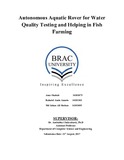| dc.contributor.advisor | Chakrabarty, Dr. Amitabha | |
| dc.date.accessioned | 2018-01-15T04:42:23Z | |
| dc.date.available | 2018-01-15T04:42:23Z | |
| dc.date.copyright | 2017 | |
| dc.date.issued | 8/21/2017 | |
| dc.identifier.other | ID 14101075 | |
| dc.identifier.other | ID 14101102 | |
| dc.identifier.other | ID 14101085 | |
| dc.identifier.uri | http://hdl.handle.net/10361/9053 | |
| dc.description | Cataloged from PDF version of thesis report. | |
| dc.description | Includes bibliographical references (pages 33). | |
| dc.description | This thesis report is submitted in partial fulfilment of the requirements for the degree of Bachelor of Science in Computer Science and Engineering, 2017. | en_US |
| dc.description.abstract | Nowadays we know that water pollution is very much common in Bangladesh. Waste from industries and rubbish dumping are two of the major sources. This causes much harm to farmers in their marine agriculture since it very largely hampers the quality of water and affects fishes. This is a very serious issue and need to be solved.
Our focus is on rural areas. We chose this because fish farming is mainly popular in villages. Our team aims to solve these problems by building a rover which will help test the quality of water and detect water pollution. We will do so my measuring the pH level and the Temperature. This will determine the acidity or alkalinity of the water, and the availability of salts underwater. By sensing this we will get different readings of pollution in different areas. Thus we will know which areas are good for what type of marine farming. By this we can make awareness of the problem which will help reduce pollution in the future.
The task that we endeavor to accomplish is not an easy one. The robot must be capable of covering long distances withstand water currents and other underwater barriers like drifting objects and marine life interactions. Maintaining a steady connection with the satellite and synchronizing with the host server is also challenging.
Our mission will have a significant impact on the fishing industry. Farmers will know where to fish, and what type of fishes they should agriculture and in what areas. Fishes will be chemical free and hence the people consuming it will also be not affected. | en_US |
| dc.description.statementofresponsibility | Anas Shahab | |
| dc.description.statementofresponsibility | Rahatul Amin Ananto | |
| dc.description.statementofresponsibility | Md Jahan Ali Shohan | |
| dc.format.extent | 33 pages | |
| dc.language.iso | en | en_US |
| dc.publisher | BRAC Univeristy | en_US |
| dc.rights | BRAC University theses are protected by copyright. They may be viewed from this source for any purpose, but reproduction or distribution in any format is prohibited without written permission. | |
| dc.subject | Aquatic rover | en_US |
| dc.subject | Water testing | en_US |
| dc.subject | Fish farming | en_US |
| dc.title | Autonomous aquatic rover for water quality testing and helping in fish farming | en_US |
| dc.type | Thesis | en_US |
| dc.contributor.department | Department of Computer Science and Engineering, BRAC University | |
| dc.description.degree | B. Computer Science and Engineering | |

